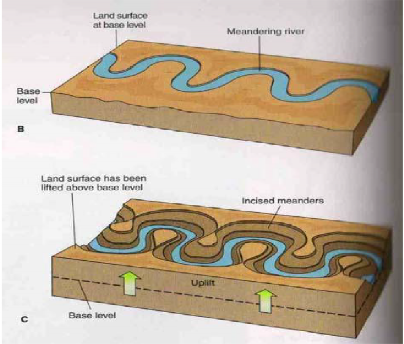7.2.3. Incised or Entrenched Meanders
If a rejuvenated river occupies a valley with well-developed meanders, renewed energy results in them becoming incised or deepened. The nature of the landforms created is largely a result of the rate at which vertical erosion has taken place. When incision is slow and lateral erosion is occurring, an ingrown meander may be produced. The valley becomes asymmetrical, with steep cliffs on the outer bends and more gentle slip-off slopes on the inner bends. With rapid incision, where down cutting or vertical erosion dominates, the valley is more symmetrical, with steep sides and a gorge-like appearance, These are described as entrenched meanders.

Diagram showing incised meander
7.3. Significance of work of River
All rivers undertake three closely interrelated activities erosion, transportation and deposition. Their work has therefore both advantages and disadvantages from a human point of view.
♤ Rapids and waterfalls interrupt the navigability of a river.
♤ By depositing large quantities of sediments in the lower course, the river silts up ports preventing large streamers from anchoring close to shores. Thus deltas are not suitable site for large ports.
♤ Many rivers flood, bursting leeves and causing damage to life and agricultural activities.
♤ Rivers with steep gorges and waterfalls provide natural sites for the generation of hydro electric power which further support industries through supply of energy.
♤ In the regions of insufficient rainfall irrigational canals support livelihood of people like Indira Gandhi canal in Rajasthan.
♤ The flood plains of large rivers with their thick mantles of fine silt are some of the richest agricultural areas of the world. Like delta of Ganga accounts for almost all the jute production of world.
♤ Fresh water fishing is important along many rivers. The organic matter brought down by the river waters provide valuable food for fishes.

7.4.1. Erosional Landforms
♤ Waterfalls
♤ Gorges
♤ Rapids
♤ Potholes
♤ V-shaped valleys
♤ Interlocking spurs
7.4.2. Depositional Landforms
♤ Deltas
♤ Levees
♤ Braided Rivers
7.4.3. Erosional and Depositional Landforms
♤ Meanders
♤ Oxbow lakes
♤ Floodplains
8. Coastal landforms
8.1. Coastal processes: Tides, Current and Waves
